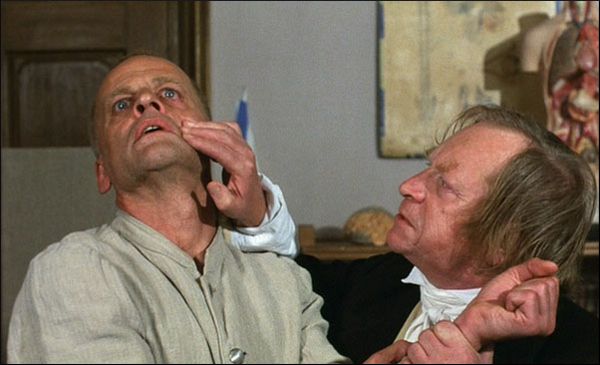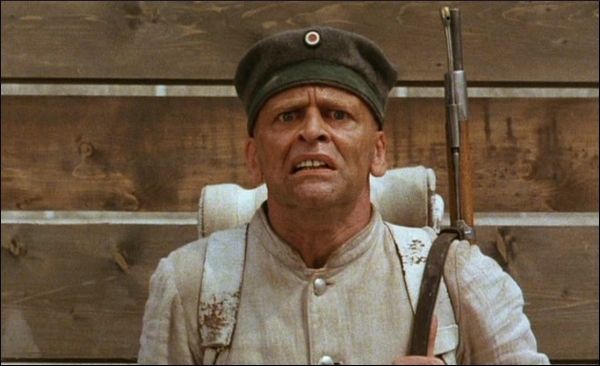Werner Herzog's film adaptation of Geor Büchner's classic stage play Woyzeck was inspired, like its theatrical source, on actual events that occurred in Germany during the late 19th century. It tells the story of an emotionally unstable, barely-functioning army cadet, who is driven to a violent and lethal outburst by his derisive and authoritarian environment. In one of his five collaborations with the legendary madman and acting genius Klaus Kinski, who plays the title role, Herzog explores human behavior in the closed society of a German army town.
"Like its theatrical source, the film is based on actual events that occurred in Germany during the late 19th century."
Woyzeck, a simple-minded soldier, uses his meager army allowance to feed his girlfriend Marie and her child (from a previous marriage). To increase his earnings, he undergoes a humiliating medical experiment that forces him to subsist on a miniscule diet of peas. This regimen is administered by a doctor who, because of his hierarchical advantage, never fails to mock the soldier. Woyzeck faces even more humiliation wherever he ventures inside the small town, most notably from his comrades and higher ranking officials. He is ridiculed for the “immorally-conceived” child he has to take care of and for other weaknesses he displays. He is further ridiculed during submissive duties like shaving the army captain, and he is exhibited and made into a laughingstock by the doctor in front of a group of assembled medical students, presented as a “most curious” result of medical experiments. He thus repeatedly becomes an outlet for the personal aggressions of higher authority. Woyzeck seeks to find solace, and his sole reason for existing and only source of affection is his attachment to Marie. However, she is confused by Woyzeck’s strange demeanor and occasionally apocalyptic ramblings, and when he discovers that she has begun an affair with a drum major, he stops functioning completely.

Herzog handles the theatrical source material by shooting primarily in long unbroken takes, using a minimum number of edits to pace the story’s separate episodes. This lends the film the look of a stage production. The dialogue is lifted from Büchner's play without major changes, so that the outdated German carries the spirit of the time portrayed. The most obvious example of archaic language is the repeated use of the third person, instead of the second, when someone is addressed by a higher ranking official. For instance, this can be noticed when the army captain tells the protagonist, “Woyzeck, er sieht immer so verhetzt aus...” (Woyzeck, he always looks like he is hunted...). The use of “he” instead of “you” was a typical way of addressing subordinates in the 19th century. Another common substitution is the use of “wie” (how) instead of “als” (when): “wie sie zum... kam” (when she arrived at the…) would nowadays be formulated as “als sie…”
"Woyzeck is a tiny cog in a curious machinery. He exists in a strange mixture of animalism and bureaucracy that eventually crushes him."
There are also many words associated with the era that uttered in the film but are hardly in use today: “gewiss” instead of “sicher” for “certainly,” “Leib” instead of “Körper” for “body,” “finster” instead of “dunkel” for “dark,” and “Weib” instead of “Frau” for “woman.” Similarly, in 19th century German, it was normal to abbreviate certain words that, in modern usage, are perhaps a syllable longer: “Löw” instead of “Löwe” for “lion,” “Aff” instead of “Affe” for “monkey,” or “Spinnweb” instead of “Spinnweben” for “cobwebs.”
What stands out, both in the structure of the play and in the interactions between the characters, are the constant assertions of humanity, which these people evidently need to voice: “You’re a man,” “I’m a woman,” “I’m a human being,” and so on. Meanwhile, animals are frequently included amidst the goings-on of a supposedly civilized town. A monkey is dressed up as a soldier and cynically marveled at for its human demeanor, while an “astronomic” horse is presented as a prophet at the town fair and instructed by its owner to show its “vieh'sche Verfnünftigkeit” (beastly rationality) and put human society to shame. Woyzeck is a tiny cog in a curious machinery. He exists in a strange mixture of animalism and bureaucracy that eventually crushes him, an obedient and troubled servant.





